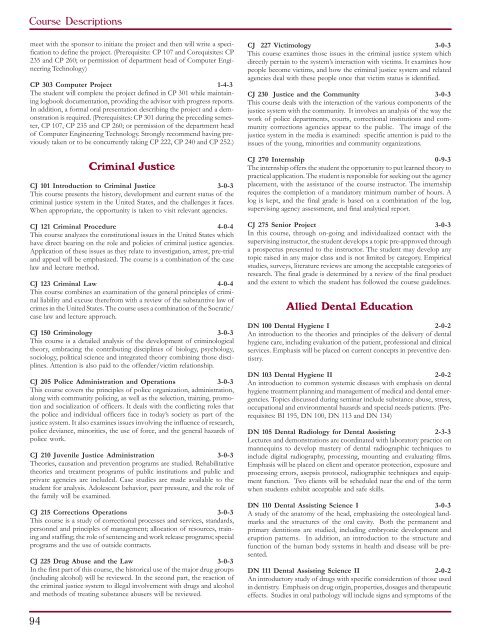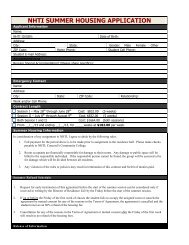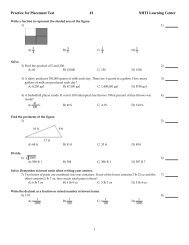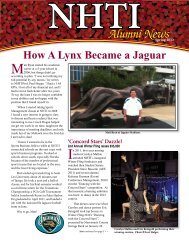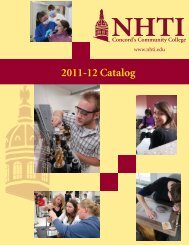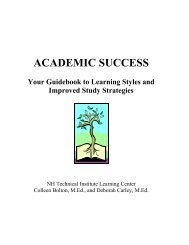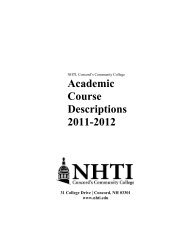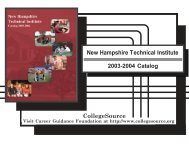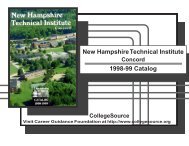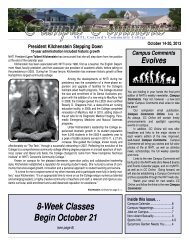Catalog 05-06 - NHTI - Concord's Community College
Catalog 05-06 - NHTI - Concord's Community College
Catalog 05-06 - NHTI - Concord's Community College
- No tags were found...
Create successful ePaper yourself
Turn your PDF publications into a flip-book with our unique Google optimized e-Paper software.
Copyright & Disclaimer Information: Copyright © 1994, 1995, 1996, 1997, 1998, 1999, 2000, 2001, 2002, 2003, 2004, 20<strong>05</strong>, 20<strong>06</strong>, 2007. <strong>College</strong>Source®, Inc. and Career Guidance Foundation. <strong>College</strong>Source® digital catalogs are derivative works owned and copyrighted by <strong>College</strong>Source®, Inc. and Career Guidance Foundation. <strong>Catalog</strong> content is owned and copyrighted by the appropriate school. While <strong>College</strong>Source®, Inc. and Career Guidance Foundation provides information as a service to the public, copyright is retained on all digital catalogs.Copyright & Disclaimer Information: Copyright © 1994, 1995, 1996, 1997, 1998, 1999, 2000, 2001, 2002, 2003, 2004, 20<strong>05</strong>, 20<strong>06</strong>, 2007. <strong>College</strong>Source®, Inc. and Career Guidance Foundation. <strong>College</strong>Source® digital catalogs are derivative works owned and copyrighted by <strong>College</strong>Source®, Inc. and Career Guidance Foundation. <strong>Catalog</strong> content is owned and copyrighted by the appropriate school. While <strong>College</strong>Source®, Inc. and Career Guidance Foundation provides information as a service to the public, copyright is retained on all digital catalogs.Course Descriptionsmeet with the sponsor to initiate the project and then will write a specificationto define the project. (Prerequisite: CP 107 and Corequisites: CP235 and CP 260; or permission of department head of Computer EngineeringTechnology)CP 303 Computer Project 1-4-3The student will complete the project defined in CP 301 while maintaininglogbook documentation, providing the advisor with progress reports.In addition, a formal oral presentation describing the project and a demonstrationis required. (Prerequisites: CP 301 during the preceding semester,CP 107, CP 235 and CP 260; or permission of the department headof Computer Engineering Technology. Strongly recommend having previouslytaken or to be concurrently taking CP 222, CP 240 and CP 252.)Criminal JusticeCJ 101 Introduction to Criminal Justice 3-0-3This course presents the history, development and current status of thecriminal justice system in the United States, and the challenges it faces.When appropriate, the opportunity is taken to visit relevant agencies.CJ 121 Criminal Procedure 4-0-4This course analyzes the constitutional issues in the United States whichhave direct bearing on the role and policies of criminal justice agencies.Application of these issues as they relate to investigation, arrest, pre-trialand appeal will be emphasized. The course is a combination of the caselaw and lecture method.CJ 123 Criminal Law 4-0-4This course combines an examination of the general principles of criminalliability and excuse therefrom with a review of the substantive law ofcrimes in the United States. The course uses a combination of the Socratic/case law and lecture approach.CJ 150 Criminology 3-0-3This course is a detailed analysis of the development of criminologicaltheory, embracing the contributing disciplines of biology, psychology,sociology, political science and integrated theory combining those disciplines.Attention is also paid to the offender/victim relationship.CJ 2<strong>05</strong> Police Administration and Operations 3-0-3This course covers the principles of police organization, administration,along with community policing, as well as the selection, training, promotionand socialization of officers. It deals with the conflicting roles thatthe police and individual officers face in today’s society as part of thejustice system. It also examines issues involving the influence of research,police deviance, minorities, the use of force, and the general hazards ofpolice work.CJ 210 Juvenile Justice Administration 3-0-3Theories, causation and prevention programs are studied. Rehabilitativetheories and treatment programs of public institutions and public andprivate agencies are included. Case studies are made available to thestudent for analysis. Adolescent behavior, peer pressure, and the role ofthe family will be examined.CJ 215 Corrections Operations 3-0-3This course is a study of correctional processes and services, standards,personnel and principles of management; allocation of resources, trainingand staffing; the role of sentencing and work release programs; specialprograms and the use of outside contracts.CJ 225 Drug Abuse and the Law 3-0-3In the first part of this course, the historical use of the major drug groups(including alcohol) will be reviewed. In the second part, the reaction ofthe criminal justice system to illegal involvement with drugs and alcoholand methods of treating substance abusers will be reviewed.CJ 227 Victimology 3-0-3This course examines those issues in the criminal justice system whichdirectly pertain to the system’s interaction with victims. It examines howpeople become victims, and how the criminal justice system and relatedagencies deal with these people once that victim status is identified.CJ 230 Justice and the <strong>Community</strong> 3-0-3This course deals with the interaction of the various components of thejustice system with the community. It involves an analysis of the way thework of police departments, courts, correctional institutions and communitycorrections agencies appear to the public. The image of thejustice system in the media is examined: specific attention is paid to theissues of the young, minorities and community organizations.CJ 270 Internship 0-9-3The internship offers the student the opportunity to put learned theory topractical application. The student is responsible for seeking out the agencyplacement, with the assistance of the course instructor. The internshiprequires the completion of a mandatory minimum number of hours. Alog is kept, and the final grade is based on a combination of the log,supervising agency assessment, and final analytical report.CJ 275 Senior Project 3-0-3In this course, through on-going and individualized contact with thesupervising instructor, the student develops a topic pre-approved througha prospectus presented to the instructor. The student may develop anytopic raised in any major class and is not limited by category. Empiricalstudies, surveys, literature reviews are among the acceptable categories ofresearch. The final grade is determined by a review of the final productand the extent to which the student has followed the course guidelines.Allied Dental EducationDN 100 Dental Hygiene I 2-0-2An introduction to the theories and principles of the delivery of dentalhygiene care, including evaluation of the patient, professional and clinicalservices. Emphasis will be placed on current concepts in preventive dentistry.DN 103 Dental Hygiene II 2-0-2An introduction to common systemic diseases with emphasis on dentalhygiene treatment planning and management of medical and dental emergencies.Topics discussed during seminar include substance abuse, stress,occupational and environmental hazards and special needs patients. (Prerequisites:BI 195, DN 100, DN 113 and DN 134)DN 1<strong>05</strong> Dental Radiology for Dental Assisting 2-3-3Lectures and demonstrations are coordinated with laboratory practice onmannequins to develop mastery of dental radiographic techniques toinclude digital radiography, processing, mounting and evaluating films.Emphasis will be placed on client and operator protection, exposure andprocessing errors, asepsis protocol, radiographic techniques and equipmentfunction. Two clients will be scheduled near the end of the termwhen students exhibit acceptable and safe skills.DN 110 Dental Assisting Science I 3-0-3A study of the anatomy of the head, emphasizing the osteological landmarksand the structures of the oral cavity. Both the permanent andprimary dentitions are studied, including embryonic development anderuption patterns. In addition, an introduction to the structure andfunction of the human body systems in health and disease will be presented.DN 111 Dental Assisting Science II 2-0-2An introductory study of drugs with specific consideration of those usedin dentistry. Emphasis on drug origin, properties, dosages and therapeuticeffects. Studies in oral pathology will include signs and symptoms of the94


